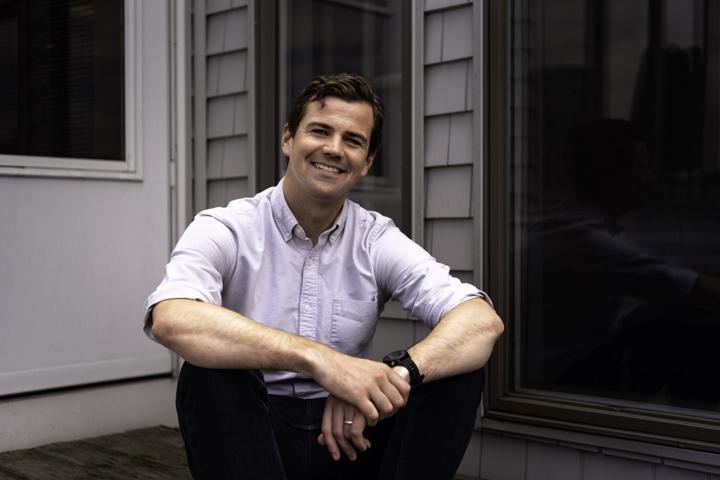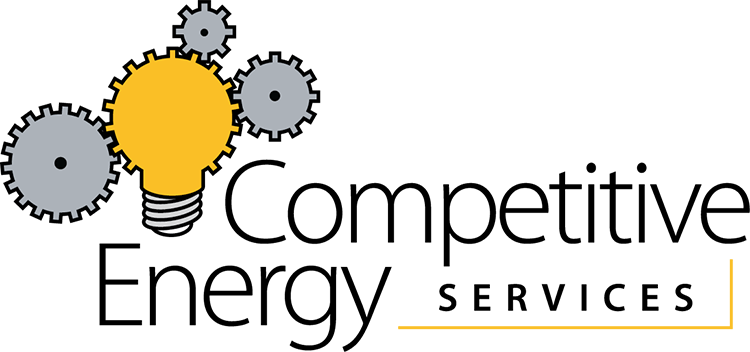
This month’s CES Spotlight shines brightly on Matt Gamache, Vice President, Analytics & Operations, known within the company, across our client base, and within the energy industry for his optimism, intelligence, energy expertise, and natural leadership ability. Matt oversees CES’ A-Team, our largest department, who individually and as a team make it a priority each day to understand all aspects of the energy industry – for the benefit of our clients and for the benefit of understanding its many nuances. Matt’s primary interests are renewable power, energy regulation, policy, and commodity markets.
Matt authored this month’s blog titled, “Beneficial Electrification and Rate Design: Expanding the Electricity Grid” about how our energy systems must begin to electrify fossil fuel-based sources of emissions to reduce greenhouse gas emissions, a transition known as beneficial electrification.
Read on to learn more about Matt’s professional background, his experience and pathway into the energy field, along with his interests, and people who have made an indelible mark on him along the way.
How did you first get involved in the energy sector? And why energy?
I’ve always been passionate about environmental issues and climate change was a primary motivator for me when I studied at Bowdoin College. At the time, I knew that I just had to figure out where I fit in and addressing climate change and being a part of the larger solution interested me. Initially, I wasn’t sure it was energy, but what appealed to me was that the energy field was interdisciplinary. I’ve always been interested in a variety of fields from science, to policy, to writing. What’s nice about the energy profession is that it’s a nice cross section of the scientific world, policy world, and economics – the intersection of those three allows me to spend days crunching numbers, reading regulations, writing up memos and analyzing findings. Working across so many different fields of study within the wider energy industry provides the opportunity to see the larger picture and I enjoy that the most.
My passion for the environment probably comes most from being an Eagle Scout. I spent time camping and loved opportunities to explore the outdoors. I’m also an animal lover, I eat pescatarian, and for those reasons, I saw climate change as THE primary threat to that environmental world that I cared so much about.
After I graduated from college, I spent a year working in Providence, Rhode Island for a group called the Downtown Providence Parks Conservancy. It was close to home for me and a nice way to begin my life in the professional world. At a Bowdoin College Homecoming, I ran into a friend of mine who was working at Competitive Energy Services at the time and on his way to the Peace Corp. He told me that CES was hiring for his position…and the rest, you could say, is history.
The move to CES was a good way for me to test out the energy industry – and it was a chance for me to be back in Maine, which I love. During my childhood, I spent time in Maine, went to college in Maine, and the idea of returning and working in a field that I was passionate about was perfect. I didn’t know much about Portland but fell in love with it and loved living in the city.
What was your initial impression of the energy field and how has your viewpoint changed over the years? What have you learned?
Initially it was overwhelming – in a good way. There’s terminology to learn and understand and almost an endless amount of information and detail which is both exciting, and at times, terrifying, especially in your early days in the field. It feels difficult to see the bigger picture because there’s so much to piece together. Starting as an energy analyst, being in the weeds, working on the details and particular client requests, makes the bigger picture all that much more meaningful and comprehensive. It gave me the foundation to stand on. Spending days trying to understand a utility invoice became more than just analyzing cost trends and led to a broader understanding of the connection between that invoice and the larger issues facing the energy industry and our existing energy systems. After years of working on a variety of energy problems and completing a graduate program at Vermont Law School, now I often see the projects we work on as part of a larger, interrelated whole. Even the little decisions made every day can actually directly relate to how we as a society are starting to address climate change and transform our energy system. This is front of mind for me. I think about it every day. In fact, this idea influenced my blog piece titled “Beneficial Electrification and Rate Design: Expanding the Electricity Grid.” This is where big changes are happening – through a lot of small changes.
What has surprised you most about working in this industry?
I think I’ve been surprised by how optimistic I am about the state of things and working in the energy industry. It would be easy to be in energy and feel worried about climate change every day or feel down about all the different problems we have to solve, but I’ve been surprised at how finding solutions for our clients can be motivating and demonstrate how we can increasingly find win-win outcomes. It’s also encouraging to see the various ways in which local and state-level policy decisions permeate through to impact the broader energy sector and are starting to transform energy systems and to increasingly point to good outcomes. That is something that leaves me feeling optimistic for a better energy future for all of us.
You just celebrated your 9th anniversary with CES in April (Happy Anniversary!). How has CES influenced your life and professional trajectory? What keeps you engaged and why CES? And what do you enjoy most about your work?
In essence, CES IS my professional trajectory. While I had another job prior to this, my time at CES makes up the majority of my career. I’m happy and proud of that. I’ve stayed here despite it being only my second “real” job. I’ve stayed here because I’ve found a perfect intersection of some of my primary interests. We also get to work on such a wide variety of problems - some days I’ll find myself working on a problem for a small local business or municipality and, later that afternoon, I could be working on issues and solutions for a large, global corporation. Wearing those different hats and seeing things from a variety of perspectives and working at a variety of scales keeps the job interesting and fulfilling. I also love being in Maine. To work in this field in the way that we get to do it here, while also being in Portland, is perfect.
The other reason I’m still here is that I like the fact that I’m part of a smaller company and that we have a culture and organization that fosters collaboration, a good feeling of equality, and intellectual curiosity. It’s so apparent from our leadership all the way through the company, there’s real encouragement to understand problems and understand the energy world at a deeper level, just for the sake of understanding it. You might think that we only spend time thinking about problems that directly relate to a specific client request or scope of work. In fact, we will spend time every week speculating on new policies or changes in the markets and dissecting what those changes and fluctuations mean for the wider industry. And that inquiry often yields insights for our clients. At the same time, we’re asking these questions of ourselves so that we can dig deeper. That’s what I mean about intellectual curiosity and the enriching experience of working at CES. With all that said, in the end it also means more expertise that we can offer to our clients.
Share about someone who has influenced you and has supported you over the years?
At CES, it falls in line with my prior answer. One of the reasons that I’m still here is that I really respect and enjoy the opportunity to learn from the experts who are here, in particular Rich Silkman and Andy Price. The company as a whole has so many smart, driven people. It’s fun to participate in an energy conversation at lunch and discuss the day’s news with people in the kitchen. That’s helped me stay interested, challenged, and engaged at CES and in this industry.
Outside of CES, my dad has been a big influence in my life and someone who I have looked to for professional advice over the years. It’s his leadership qualities and approach to the professional world that has been a big influence on me. He’s been a mentor for me my whole life.
When I moved to Portland, I was also fortunate to meet my future wife and partner, Hannah, who has influenced me in a big way. She’s another reason that I’m in Maine and has helped foster the healthy, balanced yet stimulating life that I’ve enjoyed thus far.
What would you tell other young professionals who are trying to understand the energy markets and who wish to enter the field?
We need more people all the time addressing these energy problems. The industry needs new ideas and fresh perspectives. We can’t have too much of that. With the scale and variety of problems we have, innovative approaches and diversity of perspectives are needed. That’s general encouragement for all potentially interested people to enter the field.
In terms of where to start and things to think about – and one of the things I appreciate about CES – is broadening the lens of how you look at energy can be important to how you understand the industry as a whole and how interrelated it is (often more than people realize).
A healthy intellectual curiosity, strong motivation, determination to learn, and the willingness to take initiative, are important, especially at a small company. There are so many great resources and expertise available to learn from at CES and in the industry as a whole. All it takes is someone ready to embrace those resources and take advantage of everything at their fingertips. It can be overwhelming entering such a big industry, but throwing yourself in is the only way to start…and recognize that it takes time. I’ve been in the field for almost a decade and still feel that I’ve scratched the surface. Having experience and exposure over a long time period is how you develop expertise.
What do you do when you’re not working? What are your interests?
I love sports, both as a participant and as a fan. I’m a big fan of the Boston teams, the Bruins and the Red Sox. I also love soccer and I play soccer. I play ultimate frisbee, run, hike, go birding, and Nordic ski in the winter. In my mind, getting outside and being active in Maine outdoors is the whole point of being in Maine. Finding a way to get outdoors throughout the seasons is my favorite part of living in Maine. I’m always looking forward to the next season. I also spend a lot of time with my wife and partner, Hannah, and our cat that I have come to really love (despite not being a “cat person”). I am also so fortunate to have made many friends here and have other long-time friends who have moved back to Maine in recent years. On any given weekend, I usually find a way to meet up with these friends for a meal or take advantage of Maine’s amazing craft beer scene.
Photo by Nina Callanan
